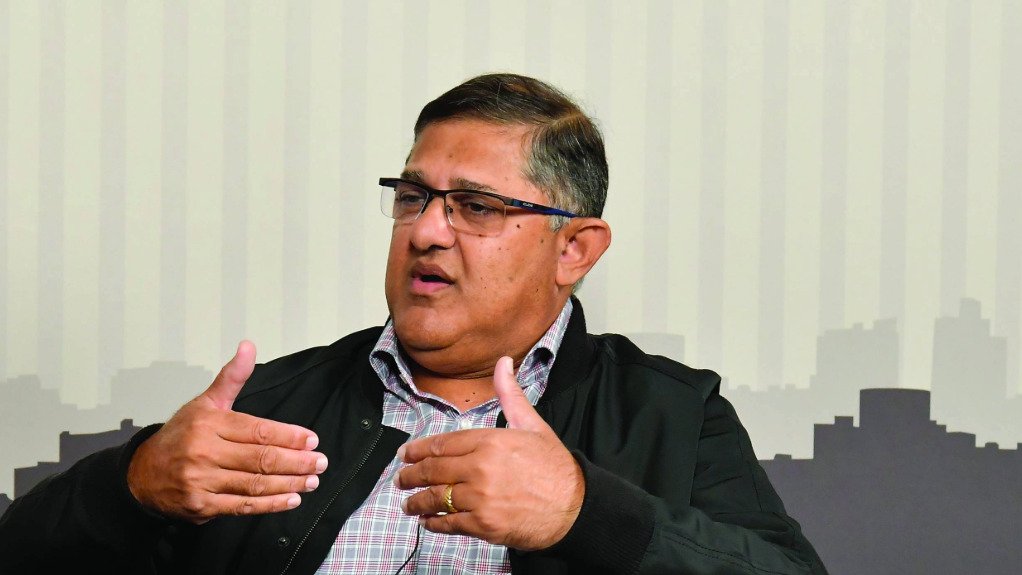Singh outlines six priority areas for G20 Environment and Climate Sustainability Working Group
In his opening address at the second G20 Environment and Climate Sustainability Working Group (ECSWG) meeting, which was held in the Kruger National Park, in Mpumalanga, on July 14, Forestry, Fisheries and the Environment Deputy Minister Narend Singh outlined the six priority areas that the working group would need to tackle.
“These priorities have been carefully chosen. They build on the successes and key outcomes of the previous G20 ECSWG presidencies, particularly those of Brazil, India and Indonesia, and are also aligned to the objectives contained in the African Union’s ‘Agenda 2063: The Africa We Want’, the blueprint for the continent’s sustainable development,” he said.
“Poverty, unemployment, hunger, inequality, environmental degradation and climate change are but a few of the formidable and interconnected issues facing the world today.
“The complexity of these issues, and their fundamental interdependency, as well as the increasingly global nature of market, finance, trade and technology frameworks, calls for enhanced reforms, inclusivity, cooperation and collective action among the nations of the world. This is against the backdrop and within the context of a rapidly changing geopolitical context,” Singh added.
He noted that the deadline to achieving the Sustainable Development Goals and the end of this critical decade for climate action was merely five years away, yet the world was far from attaining these goals and action targets.
“Poverty levels are worsening, pollution from hazardous chemicals has been increasing, and greenhouse gas (GHG) emissions reached record highs last year . . . This calls for an urgent acceleration of our efforts,” he said.
Singh explained that the first priority area, biodiversity and conservation, focuses on sharing experiences on the National Biodiversity Strategies and Action Plans and their role in effectively realising the aspirations and ambition of the Global Biodiversity Framework.
“Indeed, the G20 can play a crucial part in halting and reversing biodiversity loss by 2030, aiming for a ‘nature-positive world’ for the benefit of people and the planet. Building on the Brazilian Presidency’s Initiative on Bioeconomy, this priority area will also deal with the role of the bioeconomy, nature and wildlife economy in contributing to livelihoods of communities.
“Here, we recognise the critical role of traditional and indigenous communities in biodiversity stewardship and anti-poaching, as a foundation for sustainable livelihoods,” he said.
He added that the importance of addressing the issue of environmental crime within the G20 had also been recognised.
“Indeed, in many countries endowed with large forests and rich biodiversity as well as other natural resources, the risks of illegal logging, illicit mining, poaching and wildlife trafficking are threatening achievement of environmental, economic and social developmental imperatives.
“It is, therefore, important that. as the G20, we send a strong and clear message in this regard,” Singh said.
The second priority area that he highlighted is land degradation, desertification and drought, including water sustainability.
“It is recognised that achieving land degradation neutrality requires three concurrent actions, namely avoiding new degradation of land by maintaining existing healthy land; reducing existing degradation by adopting sustainable land management and regenerative practices, focusing on integrated water resource management, while increasing biodiversity, soil health, and food production; and scaling up efforts to restore and return degraded lands to a natural or more productive state,” Singh said.
He added that, given the limited resources to address environmental problems in the current global economy, there remained a need for countries to pool their resources together to address these challenges in a synergistic manner.
“Therefore, focusing on land degradation neutrality represents a major opportunity to contribute to sustainable development by scaling up good practices and pilot activities through large-scale transformative projects and programmes.
“These initiatives can generate multiple benefits, including positive changes in human well-being, poverty alleviation and the restoration of terrestrial ecosystems and their services,” Singh said.
He said it was important to navigate these complexities with respect for the rights of landholders, especially of marginalised, traditional and indigenous communities.
The third priority Singh highlighted was a focus on chemicals and waste management, which included the sub-priorities of sustainable chemicals management; the circular economy; waste management; waste to energy; and extended producer responsibility implementation.
“The G20 can notably support the development of a legally binding international treaty to combat plastic pollution, as agreed at the UN Environment Assembly in 2022,” Singh said.
He explained that this priority area recognised, among other things, the importance of promoting and increasing capacity for the circular economy as a regenerative system designed to minimise resource input, waste, emissions and energy loss by promoting activities such as design for longevity, maintenance, repair, reuse, remanufacturing, refurbishing and recycling.
“Furthermore, the continued and growing global demand for, and supply and use of, pesticides and industrial chemicals, as well as mounting waste from a rapid increase in critical minerals mining and processing present a significant health and environmental risk if poorly managed.
“Opportunities to transition relevant sectors to safe and non-chemical alternatives exist. It is upon us as a collective to realise that we are faced with the challenge of increased pollution from chemicals. This is an issue which this working group is well-positioned to address,” Singh said.
The fourth priority area is climate change, he said, with a focus on just transitions beyond the scope of the energy transition; adaptation and resilience, loss and damage. This priority area also includes a sub-priority on mitigation within the context of low-carbon economic development and other co-benefits beyond the reduction of GHG emissions.
“The urgency of climate action and the provision of the requisite support, on mitigation and adaptation, as well as loss and damage, cannot be overstated. The G20 process provides an opportunity to deliberate on and agree to steps to accelerate climate action and support at the required scale reflected in the outcome of the first global stocktake,” Singh said.
As a primary outcome of South Africa’s G20 presidency this year, Singh said the country would explore ways that the G20 can leverage opportunities to increase the scale and flows of climate finance.
“It is paramount for developing economy countries to be actively supported in their efforts to achieve ‘whole of society and whole of economy’ just transitions to sustainable development on the ground, through scaled access to low-cost finance, technology, capacity development and skills transfer,” he said.
Singh said that the fifth priority area was now dedicated to air quality.
“It is also increasingly recognised that many people across the globe are exposed to unhealthy and often deadly levels of air pollution, and that the impacts of air pollution extend beyond health, affecting climate, biodiversity, ecosystems and economic development.
“This is also a key issue which needs to be addressed, and to which this working group can contribute. Furthermore, we should not lose the significance of the synergies between decarbonisation and the improvement of air quality,” he said.
The final priority area that Singh noted was centred on oceans and coasts, which focuses on the importance of marine spatial planning as an integrated approach to improving the rational planning, management and governance of the ocean space and marine resources.
He said marine spatial planning was also critical as a resilience investment, to protect people and critical infrastructure from a climate change-driven increase in extreme weather events.
“More broadly, the blue economy approach can make a significant contribution to the livelihood of coastal communities around the globe as well as addressing climate change. Its sustainable, long-term development should be promoted and enhanced through collective action at the level of the G20.
“It is also recognised that plastic pollution poses a significant threat to coastal and marine environments, affecting marine life, human health and livelihoods, which needs to be addressed in an integrated and coordinated manner,” Singh said.
The final working group meeting and Ministerial meeting will be convened on October 13 to 15 in Cape Town, where it is expected that the final versions of the technical papers and final draft of the Ministerial Declaration will be discussed.
This will be followed by the G20 ECSWG Ministerial Meeting in Cape Town on October 16 to 17, where it is envisaged that the Ministerial Declaration and the other deliverables of the ECSWG will be presented.
Article Enquiry
Email Article
Save Article
Feedback
To advertise email advertising@creamermedia.co.za or click here
Press Office
Announcements
What's On
Subscribe to improve your user experience...
Option 1 (equivalent of R125 a month):
Receive a weekly copy of Creamer Media's Engineering News & Mining Weekly magazine
(print copy for those in South Africa and e-magazine for those outside of South Africa)
Receive daily email newsletters
Access to full search results
Access archive of magazine back copies
Access to Projects in Progress
Access to ONE Research Report of your choice in PDF format
Option 2 (equivalent of R375 a month):
All benefits from Option 1
PLUS
Access to Creamer Media's Research Channel Africa for ALL Research Reports, in PDF format, on various industrial and mining sectors
including Electricity; Water; Energy Transition; Hydrogen; Roads, Rail and Ports; Coal; Gold; Platinum; Battery Metals; etc.
Already a subscriber?
Forgotten your password?
Receive weekly copy of Creamer Media's Engineering News & Mining Weekly magazine (print copy for those in South Africa and e-magazine for those outside of South Africa)
➕
Recieve daily email newsletters
➕
Access to full search results
➕
Access archive of magazine back copies
➕
Access to Projects in Progress
➕
Access to ONE Research Report of your choice in PDF format
RESEARCH CHANNEL AFRICA
R4500 (equivalent of R375 a month)
SUBSCRIBEAll benefits from Option 1
➕
Access to Creamer Media's Research Channel Africa for ALL Research Reports on various industrial and mining sectors, in PDF format, including on:
Electricity
➕
Water
➕
Energy Transition
➕
Hydrogen
➕
Roads, Rail and Ports
➕
Coal
➕
Gold
➕
Platinum
➕
Battery Metals
➕
etc.
Receive all benefits from Option 1 or Option 2 delivered to numerous people at your company
➕
Multiple User names and Passwords for simultaneous log-ins
➕
Intranet integration access to all in your organisation





















